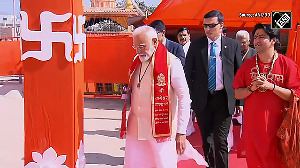The responses to my last column reminded me of a suspicion that I have nurtured for a long time -- that readers are fundamentally divided into two camps, each believing certain 'facts' about India, and that this understanding largely shapes their views.
Like you, I too have my idea of what the good society should be, and if our visions are in conflict greatly -- I recognise that a number of you also have agreed with me often -- it is understandable that our take on events will be divergent as well. Any resolution of differences, therefore, must begin with what we believe to be true. Here's my list of founding facts. I'm limiting this list to the economic arena and within this to a few broad themes; if you believe this helps we can try this exercise in other areas too.
Brick and mortar families aren't middle class
This is a theme I have explored repeatedly, especially in my studies of auto-rickshaw drivers and their livelihoods. Before we can say that someone is middle class or not, we must first make a separate determination of what we mean by the term. I use the median income for a family (depending on sources, anywhere between Rs 3,600 and Rs 5,000 a month) as a guide, and contend that those whose incomes are within some range (say 20%) of this median are middle class.
This spread of incomes that can be justifiably regarded as middle class means that you and I don't belong in that category. A lot of urban families, when they refer to themselves as middle class, are plainly mis-stating the truth. There are good reasons for this. The tendency to compare one's economic standing to that of those who are better off than oneself is common. If we're not as rich as identifiable magnates (Tatas, Ambanis, Khaitans, etc.) or even rich enough to build large houses in fancy neighbourhoods, then we must not be affluent, right? Wrong. In comparison with the great majority of Indians, anyone who can read this column is probably in the 85th percentile of income or higher.
The dissonant sense of what middle class is can also be attributed to another reason. Today's conventional idea of what a middle class lifestyle is was not first developed in India, but in the West. A middle class family in the prosperous countries is identified as being able to afford many of the modern amenities within its regular income, and also able to secure a post-retirement reserve in some way. This is what we usually mean in India too -- that 'middle class' families are ones with washing machines, scooters, maybe even a second-hand automobile; things like that. This is the middle class of a different country, not India.
Investments to benefit the poor cost money, which we do not have
This is a common defense, especially considering that the combined deficits of the state and Union governments is now running at higher than 10 percent annually. Nonetheless, this argument is an unfair one, above everything else. To say that there is no money for investments to benefit the poor directly (schools, hospitals, etc.) gives two impressions. One, that the things that money is now being spent on are necessary and cannot be cut, and two, that direct investments for the poor would cost huge sums. But both these are plainly false.
What is really enormous is the defence expenditure (up to 44% of discretionary spending by the Centre, by some calculations) which is never subjected to this kind of scrutiny. If it were, one would find right away that much of the money that is being spent has no hope of achieving the security objective that is sought, and could easily be diverted to development objectives that are less expensive as well as more likely to be reached.
Unjustifiable expenditure can be found outside the realm of defence too. Water is piped into our homes at 10 percent of the cost of gathering and delivering it. Those same homes can avail of tax waivers on interest payments in their mortgage bills to the tune of Rs 150,000 each year. Yes, each year. Contrary to the conventional view about the poor, it is the upper classes who receive the largest subsidies from the government. It is a safe bet that families like yours and mine receive at least a hundred times higher subsidies from government than those living below the poverty line do. But largesse towards the literate beautiful people is considered investment in growing the economy, whereas even meagre generosity to the poor is attacked as undeserved dole.
Second, the amounts needed for direct benefits to the poor are enormously high, in part because governments have been so lax in enforcing the terms of its generosity towards the wealthy. Nearly every government-aided school in India has received assistance in the form of land grants and other subsidies, which often require those institutions to offer 10 percent to 25 percent of their seats free of charge to poor students. But these rules are flouted almost without exception. The same is true with hospitals, our name-brand hospitals receive subsidies from state and Central governments that require them to keep a portion of their services (usually 10 per cent) free for the indigent, but like in education, here too the rich recipients of state welfare ignore their obligations with impunity.
An immediate consequence of that violation is that the cost of providing education and health to many poor families, instead of being borne by the government-aided schools and hospitals as required in their contracts, has to be double-budgeted for by the government. The Supreme Court may be finally taking a hand; in Delhi it demanded that the education department look into compliance by government-aided schools. The court's Modern School verdict was a telling reminder that we have been conveniently lax in honouring commitments made to the poor; so much so that many schools now claim that it would affect their style of education to teach poor kids along with everyone else.
Three, the use of government funds is often hidden behind layers of secrecy that conceals its misuse, and in doing so drives up the cost of serving the poor. The saga over Delhi's Public Distribution System is a case in point. Parivartan, the pioneering right-to-information organisation in the capital, began rallying citizens to demand records of their rations from dealers. Shopkeepers responded by arguing that these records are their private business documents, not subject to public scrutiny. This is a lie; the reason shopkeepers resist opening their books to the public is that their crookedness would be exposed if they did. In the few instances where Parivartan was able to force disclosure of these records, countless cases of fraud were noted. It has taken more than two years of litigation, public rallies, and lobbying for Parivartan to now establish that citizens have the right to scrutinise what rations have been distributed under their names.
The prevailing economic ideas are proven to work
When the first defences of the status quo are shown to be either immoral or deeply biased against the poor, we encounter the fallback option -- namely, the argument that there is sound economics behind the choices that are made. By this argument, subsidies for the wealthy are given so that they will in turn lift consumption and create employment, thereby indirectly benefiting the poor. This advocacy of trickle-down economics is accompanied by a frontal assault on government institutions and mindless celebration of the 'free market'. Everything must be privatised for efficiency, it argues, and India must reorient herself to become an export-driven economy like many of the Asian tigers. This is the best way, we are told, to bring meaningful opportunities for employment to millions of poor.
This is not a theory that our leaders actually have any faith in; this is just an optimistic expectation they offer with a combination of naivete and gullibility that would be laughable if not for the tragedy it brings to millions of lives. It is disgraceful to present our relative poverty as a competitive advantage in trade, and vainly hopeful to expect any fruition of this expectation.
Optimism isn't economics. Even a theory of trickle-down rewards must preserve at least the minimal standards that the poor already experience. If, in the short run, they are further impoverished or neglected to the point of death, their eventual upliftment must be seen as a promissory note that cannot be cashed. Along Gujarat's industrial corridor or Kerala's farmlands, for instance, improper management of chemicals used in various economic activities is poisoning the people. The continuing emphasis on large infrastructure projects has already displaced millions into the urban slums, and more such displacement is planned, nearly always without adequate scrutiny. How can the victims of such policies hope for eventual succour or prosperity? This question remains off the table.
In fact, trickle-down economics is a convenient cover for the recent history of economic planning in the country, which has put a higher priority on increasing the wealth of the already privileged than on meeting the needs of the millions. Politicians and policymakers insist that the engine of our growth is upper-class prosperity, and warn us against any move to derail this engine and unhinge the carriages it is meant to pull along. They point to the towers of smoke billowing from their engine, and assure us that the power to move the whole train is mounting. This assurance would be more credible if they had strategically increased upper-class prosperity themselves, and set precise measures by which to reconnect the later bogies. Unfortunately, this is not the case; instead, with a combination of shock and disregard, they merely find the carriages disengaged, and now insist that this is perfectly in line with their planning.
It would be obvious that trickle-down economics is a fraud if its advocates also pointed out that this is not the model of prosperity that rich nations of the West have taken to reach their current status. Which brings me to my second observation about today's economics -- the arguments for free trade too are unsupported by historical evidence.
I quote here from George Monbiot. 'The founding myth of the dominant nations is that they achieved their industrial and technological superiority through free trade. Nations which are poor today are told that if they want to follow our path to riches, they must open their economies to foreign competition. They are being conned. Almost every rich nation has industrialised with the help of one of two mechanisms now prohibited by the global trade rules. The first is 'infant industry protection': defending new industries from foreign competition until they are big enough to compete on equal terms. The second is the theft of intellectual property. History suggests that technological development may be impossible without one or both.' Read his full article: Enslaved by free trade for examples of what he means.
The simple fact is, free trade offered as a gold standard by those have the most to gain from it, is a bit like Henry Ford's dictum that you could have a car of any colour provided it was black.
Who decides what parts of an economy -- machines, ideas, money -- should count as trade-able things and what parts - people! - should not? Why does a nation like India -- with an abundance of cheap labour -- not demand greater mobility for its people to other places, if its leaders are so sure of the benefits of free trade? Why must it be ok for cotton grown in the Deccan to be spun in Coimbatore, packaged in Chennai, and shipped from Vishakapatnam to be sold by retailers in Brussels and Houston, but none of the participants in the creation of the product may themselves travel to those lands to wend their wares? Why should there be caps on foreign labour in rich nations, but no caps on how many soaps Unilever or Procter and Gamble sell in poor nations?
Many economists counter that we must make a beginning in free trade, and not insist on 'impractical' things like free trade in labour across national boundaries. The columnist P Sainath likes to say that economics is a profession where, when the facts don't fit the models, its practitioners prefer to change the facts rather than the models! Who defined free trade in labour to be impractical? Not Indians. The unacceptability of free trade in labour stems from the West, where opening up labour markets would be a huge political risk. But that argument can also be made about agriculture in India -- opening up this market to global competition would put hundreds of millions of people at risk. Why must our agriculture -- still the largest part of our economy -- remain struck down by subsidies in rich nations, even as we open ever more industries to foreign enterprises?
If free trade advocates are going to make exceptions, let us demand that India too can have reasonable bases for demanding its own exceptions. If the arguments are political, let us confront them on those terms, rather than continue with the make-believe economics.
This is all Leftist propaganda, just an anti-capitalist tirade
That's too simplistic, and doesn't address the economic arguments on their merits. If you're a capitalist, you should be cheerleading increased access to credit as a way of powering up the economy, but it also means you have to ask -- and answer honestly -- who should get this increased access to credit for the economy to really kick into lasting high gear. Is infrastructure funding for large investments the critical area, or is access to personal credit for individual families -- especially the poor -- more important?
A typical middle class family in India will pay up to 50 percent of its income to settle debts at enormously high rates of interest in unregulated markets. Making cheap and regulated credit available to this section will drive consumption and economic growth much more reliably that trickle down ideas will. For the poor, their debt burden is even higher, and correspondingly the potential for money freed up from debt servicing is even greater. That's capitalism.
Another concern that should remain front and centre, if you're a capitalist, is return on investment. The government of India's own figures accept that large irrigation projects like dams have taken up two-thirds of the expenditure made for such purposes and irrigated only one-third of the lands brought under new use. Small projects that preserve more local control, on the other hand, have used one-third of the money but delivered two-thirds of the benefits. What's the capitalistic determination we should make from that observation about interlinking of rivers?
If freer markets and trickle-down economics are to be the underpinning of our hopes for the future, let us have an open dialogue about their merits. Why must we hope for investments in private enterprise to eventually yield gains for all, but cannot mandate state investments in schools and health centres that have immediate employment benefits as well as long-term competitive advantages for the nation? Why is economic freedom a thing to be celebrated in the media, if its arguments do not apply to New Delhi and the state capitals who stubbornly refuse to yield any economic authority to local panchayats? Why is the interest rate on capital projects more important than the usury that millions of small borrowers face?
Our economic and political leaders do not have much faith in the free market, or in trickle-down economics, despite their apparent support for both. Their espousal of these remains limited to their potential for immediate political gains, and in economic terms alone is quite indefensible by them. As a result, therefore, what passes for economic planning begins by conceding that the rich must benefit first, and only thereafter can the rest hope to piggyback on their gains. Worse still, even the increased opportunities for investment by large business houses is not tied to proper regulation of their activities, or to welfare measures that protect the poor's current standards at least.
Our political as well as intellectual responsibility is to place this agenda under a microscope and demand that it stands scrutiny and finds public approval. Without that, we'll spend the next five years too celebrating the 'astounding' modernization of our country as recorded by media that fills 90 percent of its space with stuff designed for 10 percent of the people, and thereafter ponder with amazement the unceremonious exit of yet another 'reform'-minded government.
Your turn.






 © 2025
© 2025